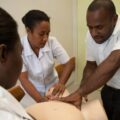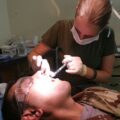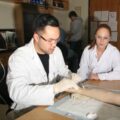
How long does it take to become a Nurse Practitioner? Aspiring NPs will first need a 4-year baccalaureate nursing degree, typically the Bachelor of Science in Nursing (BSN). Afterwards, the Master of Science in Nursing (MSN) will take 2 to 3 years of full-time study to complete. In all, it takes at least 6 years of postsecondary schooling to enter the profession.
Becoming a Nurse Practitioner
Bachelor’s Degree in Nursing
A baccalaureate degree in nursing is needed to ultimately become a Nurse Practitioner. It normally takes 4 years to complete a BSN, though accelerated options are also available. After college, some students undertake a year-long residency to be more competitive in graduate school admissions. Most go ahead and apply for RN licensure.
Professional Entry Degree: MSN
The most common professional entry degree for a Nurse Practitioner is the MSN. What are the prerequisites for getting into an MSN program? The benchmarks vary by school, but most require a BSN, current RN licensure, and at least a 3.0 GPA. Programs in advanced practice nursing also typically want each applicant’s Graduate Record Exam (GRE) scores. Some MSN programs have made RN work experience a core admission requirement, too.
Just as RNs may specialize in a particular medical area or patient population, NPs may choose an advanced practice specialty in, for example, neonatal, acute care or psychiatric nursing. To that end, many Nurse Practitioners often seek post-master’s certificates in their specialty of choice to access higher-paying employment in, for instance, consulting or specialty healthcare. Additionally, some MSN programs offer singular or dual specialization within the basic master’s degree, so students can begin specializing as soon as possible at the graduate level.
Doctorates for APNs
Alternatively, some NPs acquire a doctorate rather than a master’s degree in nursing. Most doctoral students take 4 to 6 years to complete their coursework and dissertation. There are two basic types of doctoral degrees available to advanced practice nurses: research-focused and practice-focused. The most common academic or research-oriented degree is the Ph.D. or, less frequently, the Doctor of Nursing Science (DNS). The primary practice-geared doctorate is the Doctor of Nursing Practice (DNP). For aspiring nursing professors, a Ph.D. in Nursing Science is ideal.
Licensure and Certification
After completing their education, Nurse Practitioners seek licensure with their intended state-of-practice. States look for master degrees from accredited programs and expect success on state qualifying exams. Typically, accreditation should be provided by the National League for Nursing Accrediting Commission or the Commission on Collegiate Nursing Education.
Many also require short-term classroom training in, for example, medication safety. Some states require national board certification of NP candidates with, for instance, the American Academy of Nurse Practitioners. For specialized Nurse Practitioners, specialty certification is available through the American Nurses Credentialing Center (ANCC).











Leave a Reply